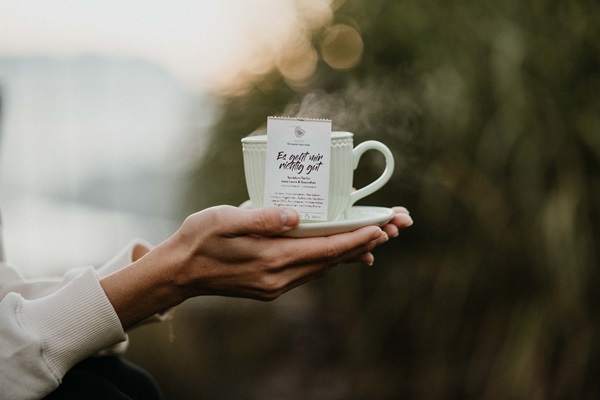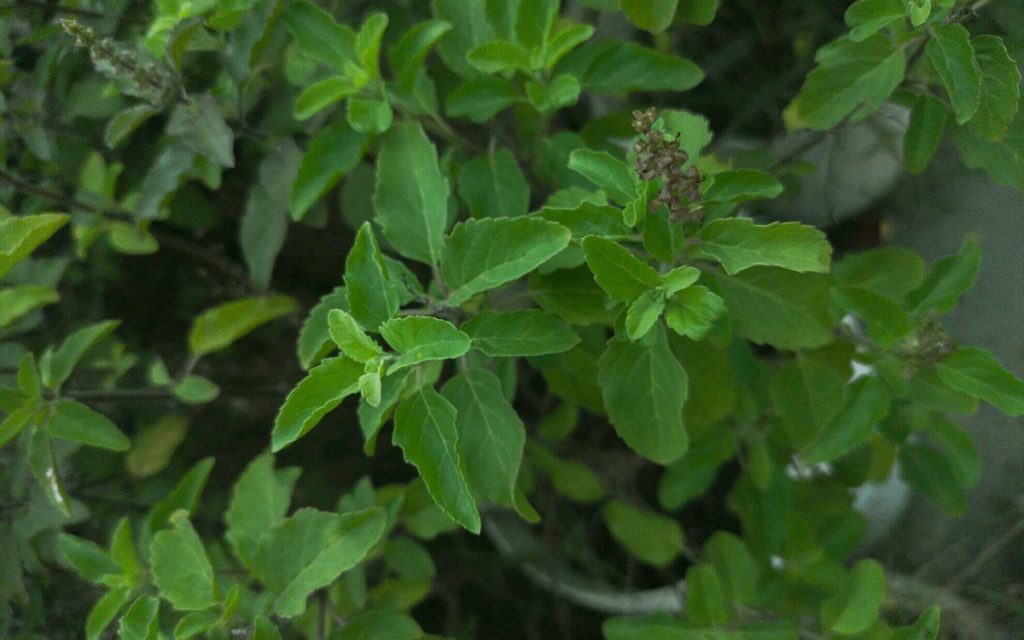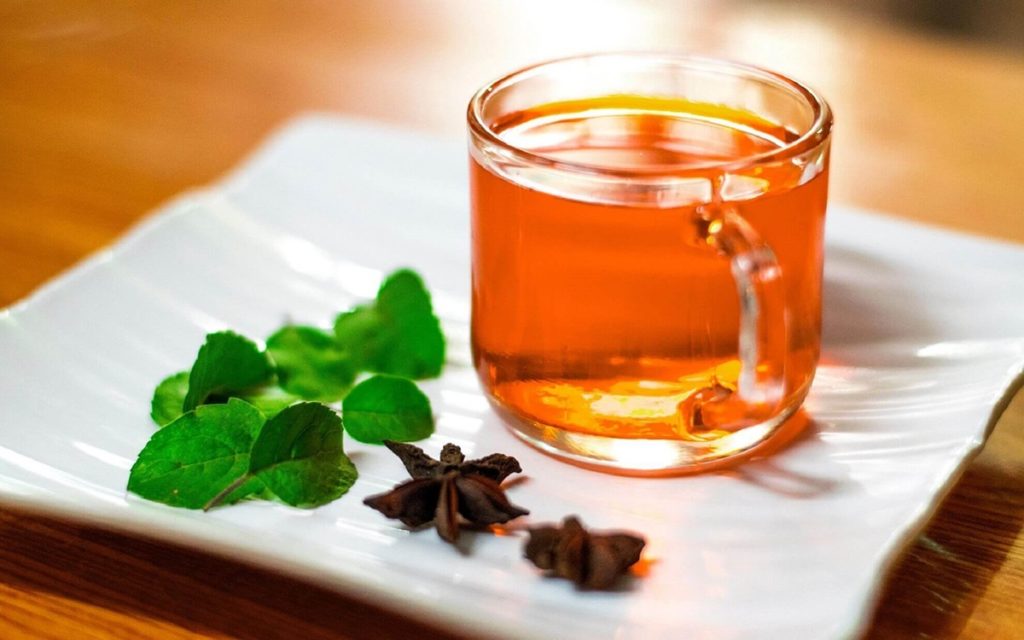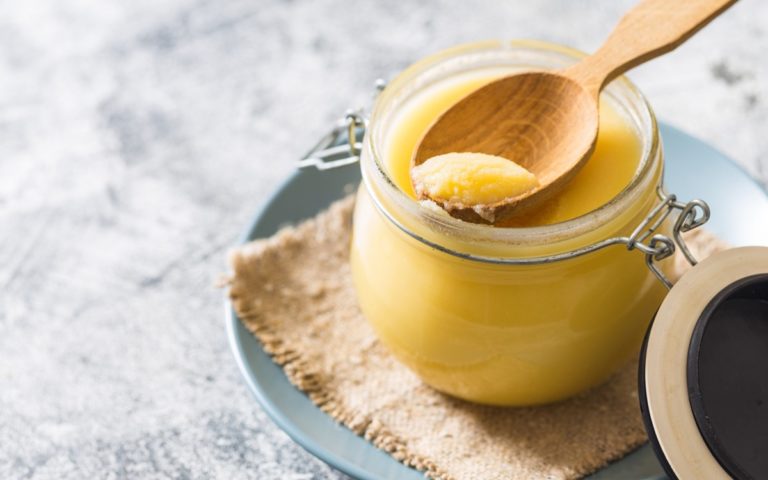Tulsi, or Indian basil, is a plant that is valued in Ayurveda for its balancing and healing properties. Whether as a fragrant essence or as a soothing tea - the herb is good for everyone and brings calm, clarity and warmth. If you are constantly struggling with stress-related symptoms or colds in your everyday life, this plant is just right for you. You can find out exactly how tulsi works and the best way to take it here.
The most important facts in brief: What is Tulsi actually?
The plant called tulsi is mainly found in south-east and south-west Asia. It belongs to the basil genus and is therefore also known as Indian basil, royal basil or holy basil.
In India, the herb has a very high status and is often used in spiritual ceremonies. According to legend, the Hindu goddess Tulsi is said to have hatched the plant in order to heal and protect people.
After all, the name Tulsi also means "the incomparable". As you can see, this spiritual herb is something very special.
This medicinal plant is also very important in Ayurveda, as it is said to have a life-prolonging and calming effect. It is considered a rasayana, i.e. a plant substance that is said to have a life-prolonging effect. But why is this actually the case?
The effect of tulsi: to calm the doshas
In Ayurvedic medicine, tulsi is used to balance the three doshas. Indian basil helps to release blockages and normalize blood pressure and blood sugar levels, particularly in the case of stress-related complaints.
As it slightly increases the Pitta dosha, the herb is particularly recommended for vata- and kapha-diseases.
Soothes the Vata dosha: stress-reducing and clarifying
The inability to adapt to stress is associated with a high Vata dosha. Tulsi reduces elevated vata and thus also all physical complaints associated with stress, such as high blood pressure, stomach cramps, flatulence and digestive problems.
The plant contains powerful antioxidants such as phenols and flavonoids and beneficial essential oils. As a result, the body learns to cope better with stress.


Indian basil also acts as an adaptogen against mental stress. In turbulent times, we can sometimes feel tense and distracted.
The herb harmonizes and dissolves fears and helps us to find ourselves again. It calms a restless mind and brings more clarity.
It is also particularly good for memory and retention. Free your body and mind from stress with this wonderful basil!
For Kapha disorders: against colds and inflammation
Basil can also heal Kapha disorders. It has an antibacterial and anti-inflammatory effect and is therefore a good home remedy for coldscoughs or fever. It clears the airways and allows you to breathe more freely again.
The plant is also an excellent Ayurvedic oral care product and can help with inflammation of the gums or mouth area. As a rinse, it brings a pleasant freshness and is good for oral health. Increased Kapha is therefore no longer a problem.
Tulsi effect on sleep problems
The calming effect of Indian basil can also promote restful sleep . promote restful sleep. If Tulsi tea is taken in the evening before going to bed, the time it takes to fall asleep can be significantly reduced and the quality of sleep improved.


Discover our European Ayurveda® teas now
Ayurvedic tea is an integral part of Indian medicine. You can use it to cleanse, heal and stimulate your body - or simply relax with a cup of tea. Here you will find selected Ayurvedic teas of different varieties in the best quality.
Taking tulsi correctly
To benefit from the effects of Indian basil, the healing leaves of the tulsi plant are used.


There are different forms of ingestion:
- As a tea: To bring the doshas back into balance, the herb is consumed in the form of a cleansing tea.
- As an essential oil: As an essential oil, basil is particularly helpful when it comes to calming the nerves and soothing the mind.
- Tulsi leaves for food: Tulsi leaves can be added to salads or other dishes and are good for digestion and against flatulence. But be careful: the leaves should not be cooked with the food.
- Chew the leaves: Even chewing the raw leaves of the plant can be effective. Indian basil is considered a miracle cure for torn corners of the mouth and bleeding gums. If you suffer from a dry cough or feel bloated, you can also gnaw on the leaves.
Incidentally, an Ayurvedic insider tip for your morning routine is to take 5 leaves with a little water on an empty stomach in the morning. This is said to improve brain and memory performance.
The easiest and most effective way to start is to enjoy tulsi as a tea. That's why we'll now show you how to take a break with this hot drink.
Attention:
You should only take dietary supplements after consulting your doctor. The information provided in this article is for educational purposes only and is not a substitute for medical advice! The recommended dietary supplements should be taken at your own discretion.
Tulsi tea: effect and preparation
Indian basil is usually taken in the form of tea. Tulsi tea is not only highly valued for its effect, but also for its good taste. It has a sweet, lemony note, but also tastes slightly peppery.


If you suffer from digestive problems, stress or a weak immune system, the drink is particularly beneficial. The tea is also recommended for colds or high blood pressure.
For the Tulsi tea to be effective, you should drink 1-2 cups of it daily over a period of six weeks.
Ready-made tea blends are available packaged in stores. However, if you want to do something particularly good for yourself, get the tulsi leaves and prepare the tea yourself. It's very easy and can be customized to your liking!
Preparing Tulsi tea
All you need to make a nice cup of tulsi tea is a cup of tea:
- 1 teaspoon tulsi herb
- 200 ml water
Put the herb in a cup and bring the water to the boil. Pour the water over the herb and leave the tea to infuse for about 6-10 minutes. That's all there is to it!
Of course, you can also spice up the tea a little. Add about ½ teaspoon of turmeric and 1 teaspoon of ginger to make the tea even spicier and tastier!
Tulsi tea: how often should you drink it?
As with most things, the right dose is important here too. It is recommended to take the tea over a maximum period of six weeks. During this time, women can drink about 1-2 cups a day.


Why only women? Well, men are advised not to drink the tea every day, as it can inhibit the formation of sperm and lead to constipation.
But beware: the tea should never be drunk during pregnancy or while breastfeeding ! However, if you stick to the recommended dose and avoid drinking tea during pregnancy, there is nothing to stop you enjoying this stimulating hot drink!
Tulsi tea: special tips for every dosha type
If you want to slow down a particular dosha, we have a few tips here to make the tea even more effective.
Dampen Kapha
If you have cold symptoms due to excess Kapha, you can add a little honey to your tea. Alternatively, you can also stir in some original Ayurvedic ghee.
Balancing Vata
If you want a clearer mind or suffer from stress-related digestive problems, you should dampen your Vata dosha a little. In this case, add some ginger, fennel and cardamom to the tea and drink the tea with meals.
For Pitta types
We advise you to drink Tulsi tea after a meal and before going to bed. The tea is particularly recommended as an evening drink for depressive moods and anxiety, as it allows you to calm down pleasantly and thus ensures a restful sleep.
Tulsi oil for a clear mind and to strengthen the immune system
Due to its essential fragrances, the plant is also occasionally used as a pleasant aromatic oil. However, a small dose is absolutely sufficient.
Simply add a drop of Tulsi oil to around 50 ml of base oil and enjoy the pleasant fragrance. The mixture strengthens the immune system and is a good support against infections.
Especially during or after work, the balancing fragrance can also provide more concentration and focused energy. It allows you to breathe deeply again and soothes frayed nerves. The oil ensures that the mind becomes more focused again and work becomes easier.
So if you notice an increased Kapha or Vata dosha and long for a little more balance for body and mind, this herb is the ideal solution for you.
It brings the doshas back into balance and helps you to find the right balance again. Try it out and treat yourself to a soothing Tulsi tea!
Tulsi: side effects and possible risks
Like all food supplements, tulsi can have a laxative effect or cause stomach problems if consumed in excess.
Pregnant women, breastfeeding women and people with pre-existing conditions in particular should always consult a doctor before taking tulsi.
Due to a lack of studies, it cannot be ruled out that the dietary supplement may interact with medication (particularly in the case of type 2 diabetes, hypothyroidism or directly after an operation).
So if you have any pre-existing conditions or are taking medication, you should urgently discuss the use of tulsi with your doctor.


How can I regulate my nervous system? 4 tips from European Ayurveda®
An overstimulated nervous system is one of the most common causes of chronic complaints. Irritable bowel syndrome, exhaustion, hormonal imbalances, insomnia and migraines are common consequences. We show you how you can regulate your nervous system with European Ayurveda and get back into Vata balance.
Cover picture: © Dragonite_East - istockphoto.com (file no.: 8999069161337573242)
Sources
(1) Yadav, S. P. et al. (2024). Health and therapeutic uses of Tulsi (Holy Basil). Octa Journal of Environmental Research 12(1), 4-15. http://www.sciencebeingjournal.com/sites/default/files/02%2020240206_1201_PP02.pdf.
(2) Mandal, A.K., Poudel, M., Neupane, N.P., Verma, A. (2022). Phytochemistry, Pharmacology, and Applications of Ocimum sanctum (Tulsi). In: Masoodi, M.H., Rehman, M.U. (eds) Edible Plants in Health and Diseases. Springer, Singapore. https://doi.org/10.1007/978-981-16-4959-2_4.
(3) Parveen, A. et al. (2023). Tulsi. In: Zia-Ul-Haq, M. et al. (eds) Essentials of Medicinal and Aromatic Crops. Springer, Cham. https://doi.org/10.1007/978-3-031-35403-8_38.
(4) Thakur, S. et al. (2021). Tulsi - A Review Based Upon Its Ayurvedic and Modern Therapeutic Uses. International Journal of Research and Review 8(5), 263-272. https://doi.org/10.52403/ijrr.20210534.






